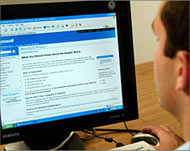Hi-tech bid to rob bank foiled
Israeli police are investigating with British forces an attempted robbery of 219 million pounds ($421.2 million) at the London offices of the Japanese bank Sumitomo.

A gang hacked into computers at Sumitomo in October 2004 and attempted to transfer the cash to 10 accounts around the world, the Israeli fraud squad said on Thursday.
The attempt has raised fears of the threat posed by organised gangs of computer hackers. British police have in the past warned financial institutions to be alert to such crimes.
A spokeswoman for Britain’s National High Tech Crime Unit confirmed there was an ongoing investigation into the attempted robbery but declined to offer further details.
Israeli connection
Israeli police said they had arrested a 32-year-old man in connection with the crime. Yaron Bolondi was arrested in a suburb near Tel Aviv under suspicion of being involved in an attempt to launder 20 million pounds. Two British investigators had flown out to Israel.
“The fact is it was a total failure and it was a total failure along the line, and the crooks left their footprint, which we gave to the police,” Philip Martin, general counsel of Sumitomo Mitsui Banking Corporation Europe, said.
|
“The fact is it was a total failure and it was a total failure along the line” Philip Martin, |
Key-logging software has mushroomed over the last 12 months. British computer protection company Sophos counts 15 to 20 new keylogging programmes every day, three to four times as many as a year ago.
These programmes target computer users who do online banking and other financial transactions, recording keystrokes and thereby acquiring account numbers and passwords.
“This is affecting everyone using a computer,” senior technical consultant Graham Cluley said.
According to him, there is a 50% chance that an unprotected computer will be infected within 10 minutes after connecting it to the internet, even without opening websites or emails. This risk rises to 90% after 40 minutes.
Spyware menace
 |
|
Hackers use spyware to target |
How Sumitomo computers could have been infected was unclear, as they would have probably run anti-virus software programmes.
Sumitomo’s Martin said: “Our computer systems are such that you can’t get into them.”
However, besides key-logging software there is also a hardware-based version, which requires someone to put a small box between the keyboard and the computer. The box, with some computer memory built in, would store the keystrokes.
Spyware, or software that spies on people, is available at
as little as 50 pounds, according to the NCC Group, an information technology specialist.
The NCC Group said to protect themselves companies need to “lock down” their computers, carry out regular sweeps of the network, conduct regular testing, and make sure they know the technician installing the software.